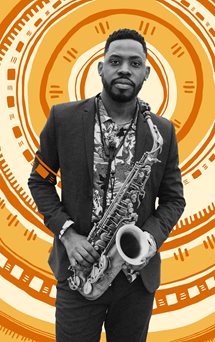Trinidadian-born saxophonist and composer Jesse Ryan has been praised as a fresh new voice, with a unique perspective on the music of today. His Bridges project is an emerging, eclectic quintet that bridges both the jazz and Afro-Caribbean traditions - A true celebration of the cultural, rhythmic and expressive connections between North America and the islands.
We asked Jesse to tell us more about his music, inspiration and his debut album, launching later this year.
 Original photo courtesy of Robin Sassi. Artwork by Amber Williams-King
Original photo courtesy of Robin Sassi. Artwork by Amber Williams-King
You grew up in Trinidad & Tobago and your grandfather is Clifton Ryan, a calypso veteran known as the Mighty Bomber. Can you tell us more about the Afro-Caribbean elements in your music?
I grew up surrounded by a rich heritage of music but I only began to delve deeper into the various folk traditions that exist on the islands of Trinidad and Tobago in my late teens. Much of the music that I play and write falls within the modern jazz idiom but I also wanted to discover some of my ancestral DNA through music. With my Bridges project I’ve begun to explore folk rhythms from the Tambrin music tradition that is found on the island of Tobago. This tradition of drum and dance is also found on the island of Grenada which is the homeland of my grandfather Clifton Ryan, a calypso veteran known as the Mighty Bomber. I’m currently writing and composing a suit of music that explores the Tambrin tradition more thoroughly. My hope is to create music that allows me to evolve while sharing my unique Afro-Caribbean musical perspective.
You’re not only a saxophonist but also a composer, arranger and producer. How do you incorporate all these different roles into your craft? What kind of challenges do you face?
I see all these roles as different stages of my personal creative process but also as different hats I can wear when I’m working collaboratively. I’m really a student of composition, arranging and production as I’m always seeking new concepts, approaches and technology that will inform and enrich my ability to communicate effectively through music. I’ve had the opportunity to compose and arrange for a variety of contexts, including big bands, small pop, soul and jazz ensembles and work as a horn and string arranger. As a creative person who is trying to build a business with multiple brands, my biggest challenges are managing my time and developing a strategy to fund each project. I’ve been actively seeking professional development opportunities and trying to build a network of people around me who I can form symbiotic, professional relationships with. Receiving this award will be a huge step towards assisting me with developing some of the resources I need.
You’ve described yourself as an educator. Why do you feel it is important to pass on musical knowledge and teachings?
I began teaching at the age of 16 yrs old and very quickly I realized that the process of trying to dissect and articulate a musical idea or concept helped me reinforce and think more critically about what I was taught, and that is something I really enjoy. I believe that music is a living breathing thing that is kept alive by those who create, compose and perform. The transfer of knowledge and teachings is crucial in ensuring that all music, with all its cultural and historic context is preserved for future generations. As an educator my primary goal is to inspire my students to keep evolving and develop a lifelong love of learning.
Your debut album Bridges is set to come out this year. Tell us about it.
My Bridges project is an emerging, eclectic quintet that straddles both the jazz and Afro-Caribbean traditions - A true celebration of the cultural, rhythmic and expressive connections between North America and the islands of the Caribbean. With this project I’m anticipating the release of my debut album entitled Bridges in fall 2020.
Bridges was formed in 2016 to explore my passion for composing, performing, and recording music that celebrated my Trinbagonian cultural heritage and the tradition of North American Jazz. As far back as I can remember, one of the first things that attracted me to jazz was the fact that it creates a space where the collective is more important than the individual. A space for collaboration, cultural exchange, and where old and new worlds meet.
“Good music is always a bridge: it connects people, places and cultures and is a pathway of opportunity for both the creator and the listener.”
How does it feel to be nominated for the Emerging Jazz Artist Award for the second year in a row?
I feel ecstatic and honored to be considered again because Toronto is an amazing music city with many great players and emerging jazz artists. Being selected as a finalist affirms that I am on the right path and it also allows me an opportunity to stop and celebrate the progress I’ve made along with the other finalists.